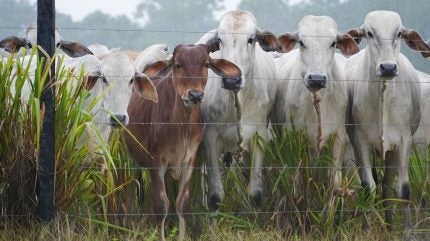
Greenpeace has alleged that Brazilian beef giant JBS indirectly purchased cattle raised on protected indigenous land in the Amazon rainforest.
The animals were allegedly reared in the Pequizal do Naruvôtu Indigenous Territory.

Discover B2B Marketing That Performs
Combine business intelligence and editorial excellence to reach engaged professionals across 36 leading media platforms.
According to Greenpeace, between 2018 and 2025, Brazilian agribusiness entrepreneur Mauro Fernando Schaedler transferred at least 1,238 cattle from a farm overlapping with this territory to another property with no recorded irregularities.
Greenpeace said this transfer was carried out to disguise the origin of the animals, a practice referred to as ‘cattle laundering’.
The activist group alleged that these animals were later supplied to two JBS slaughterhouses authorised for exports.
One of the facilities, located in Água Boa, Mato Grosso state, received cattle from Fazenda Itapirana from February 2019 until February 2025. This slaughterhouse is authorised to export to destinations including Hong Kong.

US Tariffs are shifting - will you react or anticipate?
Don’t let policy changes catch you off guard. Stay proactive with real-time data and expert analysis.
By GlobalDataThe second slaughterhouse, in Barra do Garças, bought cattle from Fazenda Itapirana between 2018 and 2021 and exported meat to several European countries during that period.
JBS had not responded to Just Food’s request for comment on the Greenpeace allegations at the time of writing.
In a statement, Greenpeace said the facility “continues” to export to Europe “today”, although it has not identified data showing purchases from Fazenda Itapirana after July 2021.
“This investigation provides just one example of how JBS and large corporations profit and expand from the absence of a comprehensive, effective and transparent control system for their supply chain, which indirectly supports environmental damage and the violation of constitutional rights and guarantees, especially the fundamental rights of Indigenous Peoples in Brazil,” Greenpeace’s statement read.
The organisation urged European governments and parliamentarians to reject the EU-Mercosur trade agreement to ensure the “swift application” of the EU Deforestation Regulation.
The EU-Mercosur agreement is a trade and cooperation deal between the EU and the Mercosur bloc, comprising Argentina, Brazil, Paraguay, and Uruguay, and finalised in a political agreement in December 2024.
Greenpeace said the deal would increase meat import quotas from Brazil to the EU “without guarantee that these imports are not linked to deforestation or violations of Indigenous Peoples’ rights”.





